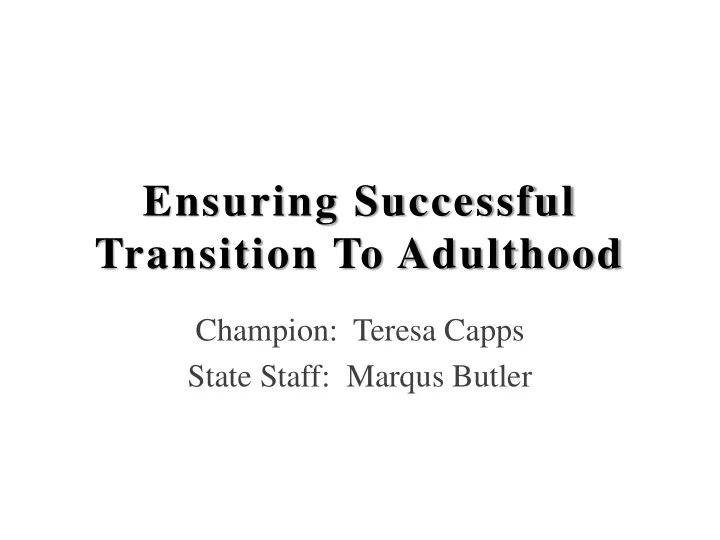

Ensuring Successful Transition To Adulthood Champion: Teresa Capps State Staff: Marqus Butler
CHILD SYSTEM ADULT SYSTEM Special Education Child Welfare Juvenile Justice Criminal Justice Adult Mental Health/Specialty Programs Child Mental Health Housing Vocational Rehabilitation Substance Abuse AGE Birth Death
The Reality Youth and young adults ages 16-25 with serious mental health and substance abuse conditions are our most vulnerable group facing transition to adulthood. 1. Least likely to graduate from high school 2. Three times more likely to commit a crime 3. More likely to engage in substance abuse 4. Less likely to find, obtain and keep a job 5. Least likely to achieve independent living (Hagner, et al, 1999; Vander Stoep, et al, 2000, HHS, 2002, and Pandiani et al, 2004)
Oklahoma Department of Mental Health and Substance Abuse Services CMHC Service Areas BEAVER KAY NOWATA CIMARRON TEXAS HARPER WOODS GRANT OSAGE CRAIG OTTAWA WASHINGTON ALFALFA DELAWAR E ROGERS ELLIS GARFIELD NOBLE MAYES Green Country Behavioral Health WOODWARD MAJOR PAWNEE Creoks Behavioral Health TULSA LOGAN KINGFISHER PAYNE DEWEY BLAINE CREEK ADAIR CHEROKEE WAGONER Northwest Center for Behavioral Health LINCOLN ROGER MILLS CUSTER MUSKOGEE OKLAHOMA Edwin Fair CANADIAN Okmulgee SEQUOYAH OKFUSKEE CRS and FCS MCINTOSH WASHITA BECKHAM POTTAWATOMIE CLEVELAND CADDO SEMINOLE GRADY HUGHES HASKELL MH and SA Centers of Southern OK PITTSBURG KIOWA Red Rock Inc GREER LATIMER McCLAIN LEFLORE PONTOTOC COCMHC GARVIN COMANCHE JACKSON HARMON COAL Jim Taliaferro MH Center STEPHENS MURRAY TILLMAN COTTON ATOKA JOHNSTON NorthCare, Hope, Red Rock JEFFERSON PUSHMATAHA CARTER McCURTAIN CHOCTAW LOVE MARSHALL Carl Albert BRYAN Grandlake
Oklahoma Department of Mental Health and Substance Abuse Services Systems of Care Transition Services Access Points Green Country Behavioral Health Creoks Behavioral Health Grandlake CRS and YST COCMHC Altus Youth and Family Services NorthCare, Hope
Reported Experiences of Abuse by OHTI Consumers Lifetime Experience of Abuse for OHTI Young Adults (OK Worker Baseline) Abused (either type) Physical Abuse Sexual Abuse Abused (both types) 30% 28% 27% 27% 25% 25% 24% 22% 21% 19% 20% 17% 16% 15% 14% 15% 10% 5% 0% Norman HT (85) Tulsa HT (74) OHTI (159)
A Trauma Informed System • Community-Based and Easy Access • No Wrong Door (Substance Abuse and Mental Health) • Trauma Trained Staff • Calming Rooms • Therapeutic Options • Strengthen Based and Consumer Driven • Recovery, Resiliency and Empowerment
Reported Substance Abuse by OHTI Consumers OHTI Young Adults: Substance Use at Baseline (NOMs) Norman (85) Tulsa (74) OHTI (159) 70% 62% 59% % of Young Adults Reporting Use 60% 56% 50% 40% 37% 40% 34% 27% 30% 21% 20% 16% 10% 6% 5% 5% 5% 5% 4% 4% 4% 3% 2% 2% 1% 0% Substance Type
ODMHSAS 2011-2010 Most Frequent Treated Diagnoses 2011 Most Frequently Treated 2010 Most Frequently Treated Diagnosis Diagnosis Age Diagnosis Unduplicated Number Age Diagnosis Unduplicated Number Served Served 13-17 Substance Abuse 1,234 13-17 Substance Abuse Disorders 995 Disorders 13-17 Depressive Disorders 978 13-17 Depressive Disorders 1,031 13-17 Attention Deficit and 874 13-17 Attention Deficit and 811 Disruptive Behavior Disruptive Behavior Disorders Disorders 18-25 Substance Abuse Disorders 3,760 18-25 Substance Abuse 4,699 Disorders 18-25 Depressive Disorders 2,928 18-25 Depressive Disorders 2,948 18-25 Bipolar Disorders 1,529 18-25 Bipolar Disorders 1,419
Focused on Wellness • COCMHC Wellness Center- Holistic Health Approach Hyper Tension, Diabetes, Dental Care, Smoking Cessation, Weight Loss • Northcare-Variety Care partnership • Medication • According to the Oklahoma Health Care Authority 19-25 year olds represent 38.4% of the Adult population Uninsured in Oklahoma • 40.6 SA and MH – life expectancy • 57.5 MH — life expectancy • 43.2 SA — life expectancy • 71.7 General Population – life expectancy
Integrated Services • Currently not integrated for young people aging out of care • Public Mental Health and Substance Abuse System is currently based on need • Public Mental Health and Substance Abuse System offers integrated funding streams • Currently silo at some services access points
Workforce • Lowest Paid and Bachelors Level Education • Younger Employee • Employee Satisfaction • Burnout • Vicarious Trauma
The Future for Our Transition System • Funding Needs to Respect the Difference/ Engagement will be Different • Respect and Understanding of Youth Culture is Critical/ Involves Different Ways of Doing Business • High Perception of Opportunity /Service Delivery Process that Focuses on Hopes and Dreams • Flexibility is Necessary /Got to Build the Plane While Flying it
Implications for Practice….Make Services Appropriate for Developmental Stage Examples from New Models: Peers and Social Context Peer context important Group treatment settings for TAY (e.g. 16-25 yr olds) Peer Mentors Peers on staff Hang out space for young people Romantic relationships – social support may come from partner/spouse/boy or girl friend Teach relationship skills
Implications for Practice….Make Services Appropriate for Developmental Stage Examples from New Models: Support Identity Formation Resist urge to parent or be authority Allow for experimentation – process lessons learned Incorporate youth voice/ownership at every level Person Centered Planning Young adult advisory group for program Youth Councils in each area
Evidenced Based and Promising Practices • Ansell-Casey Life Skills Assessment (ACLSA) • Transition to Independence Process (TIP) • Wraparound • Supported Education • Supported Employment • Assertive Community Treatment (ACT) • Illness Management and Recovery Program (IMR)
Potential Possibilities’ • Raising the Medicaid age to 25 • Lowering the age you can sign an apartment for a lease • Improving Medicaid access for juvenile justice involved youth and youthful offenders leaving medium secure/adult corrections • Developing age requirements to seek services if you are estranged from your parent/guardian? • Medicaid transition planning benchmarks • Improved statewide access points • Transition services program requirements
Contact Information Transition to Adulthood Champion Teresa Capps, MEd, LPC Director, Child and Family Services Central Oklahoma Community Mental Health Center tocapps@odmhsas.org 405.573.3811 Transition to Adulthood Staff Support Marqus Butler, MHR Oklahoma Healthy Transitions Initiative Project Director ODMHSAS-CO mbutler@odmhsas.org 405.522.0994
Recommend
More recommend